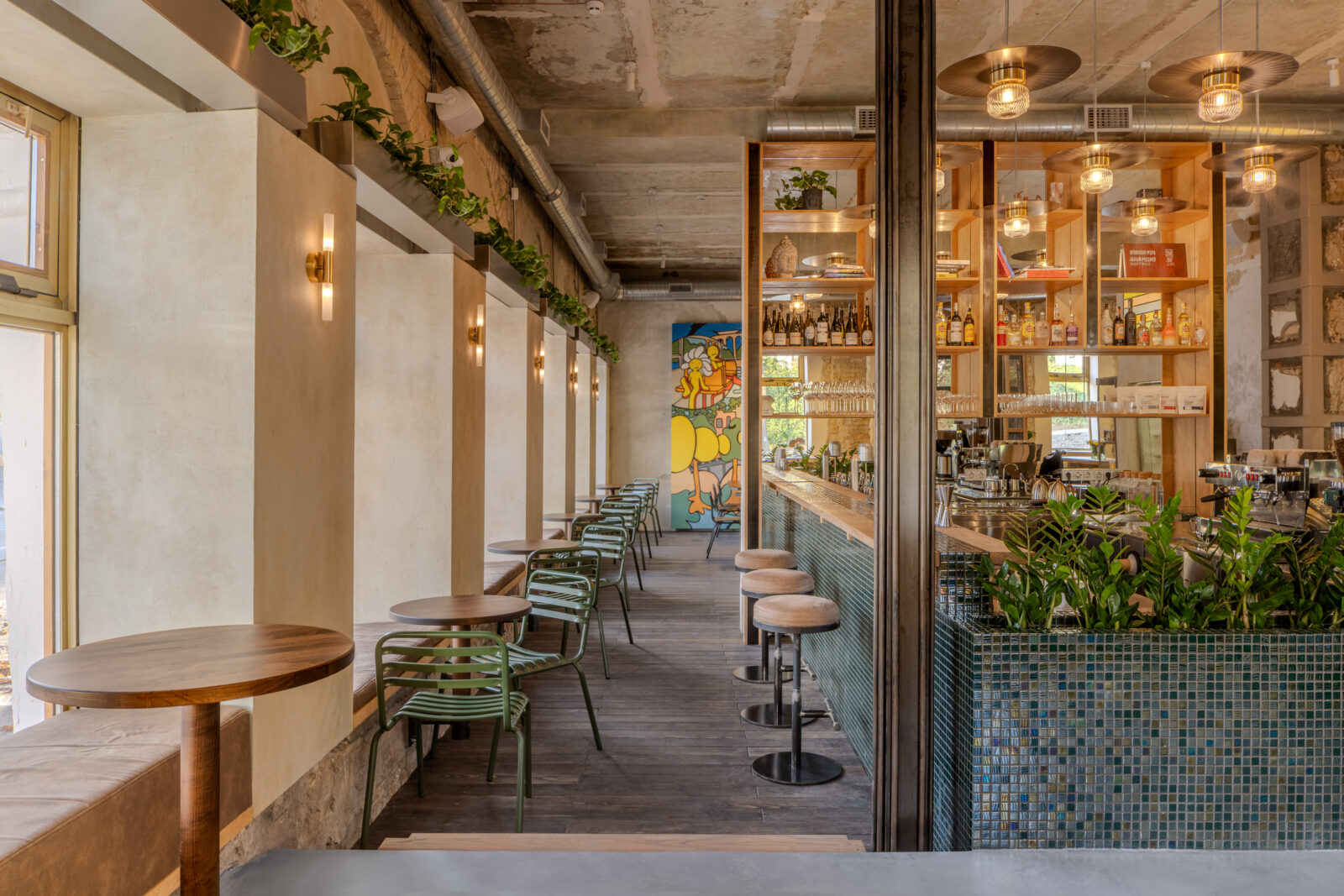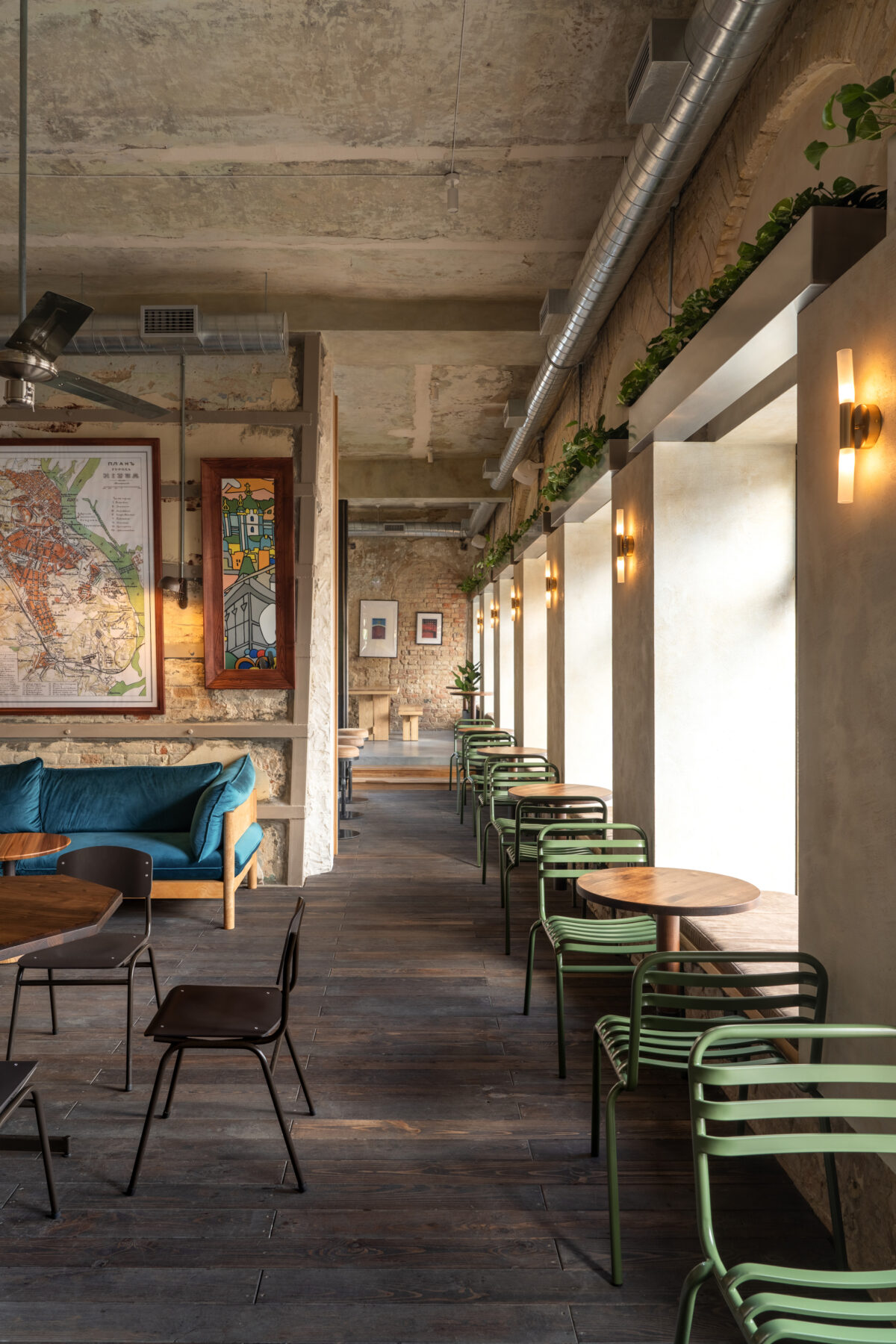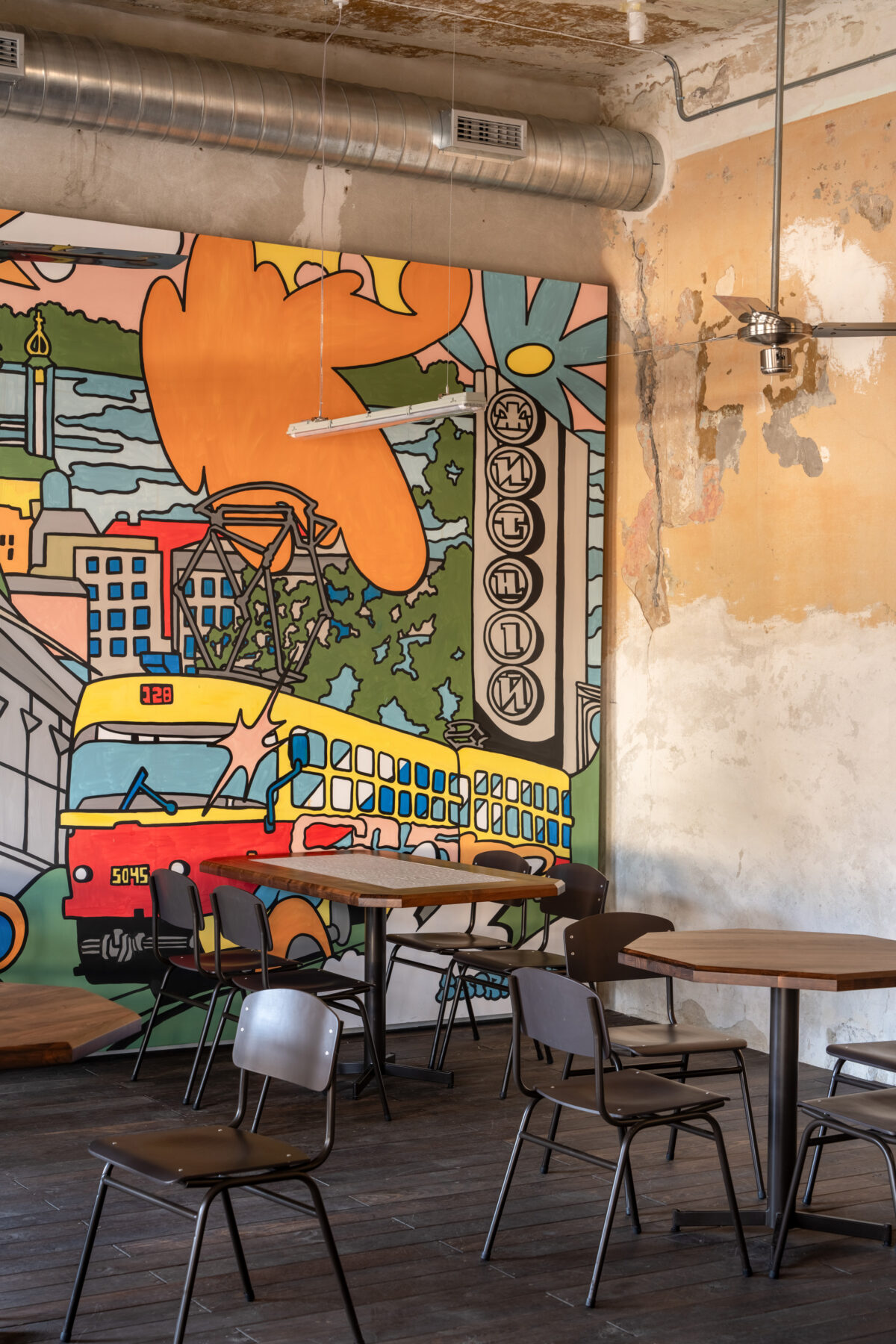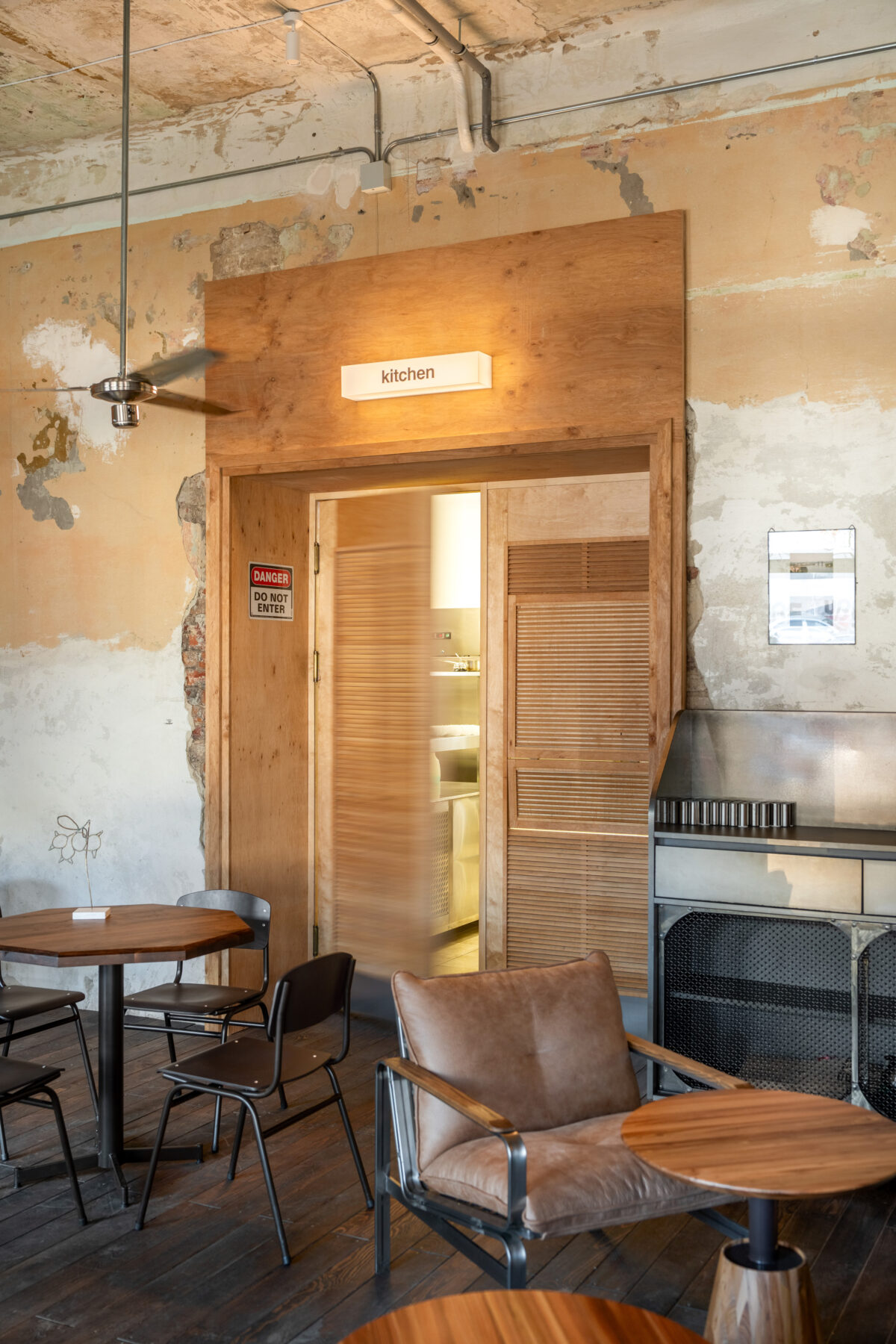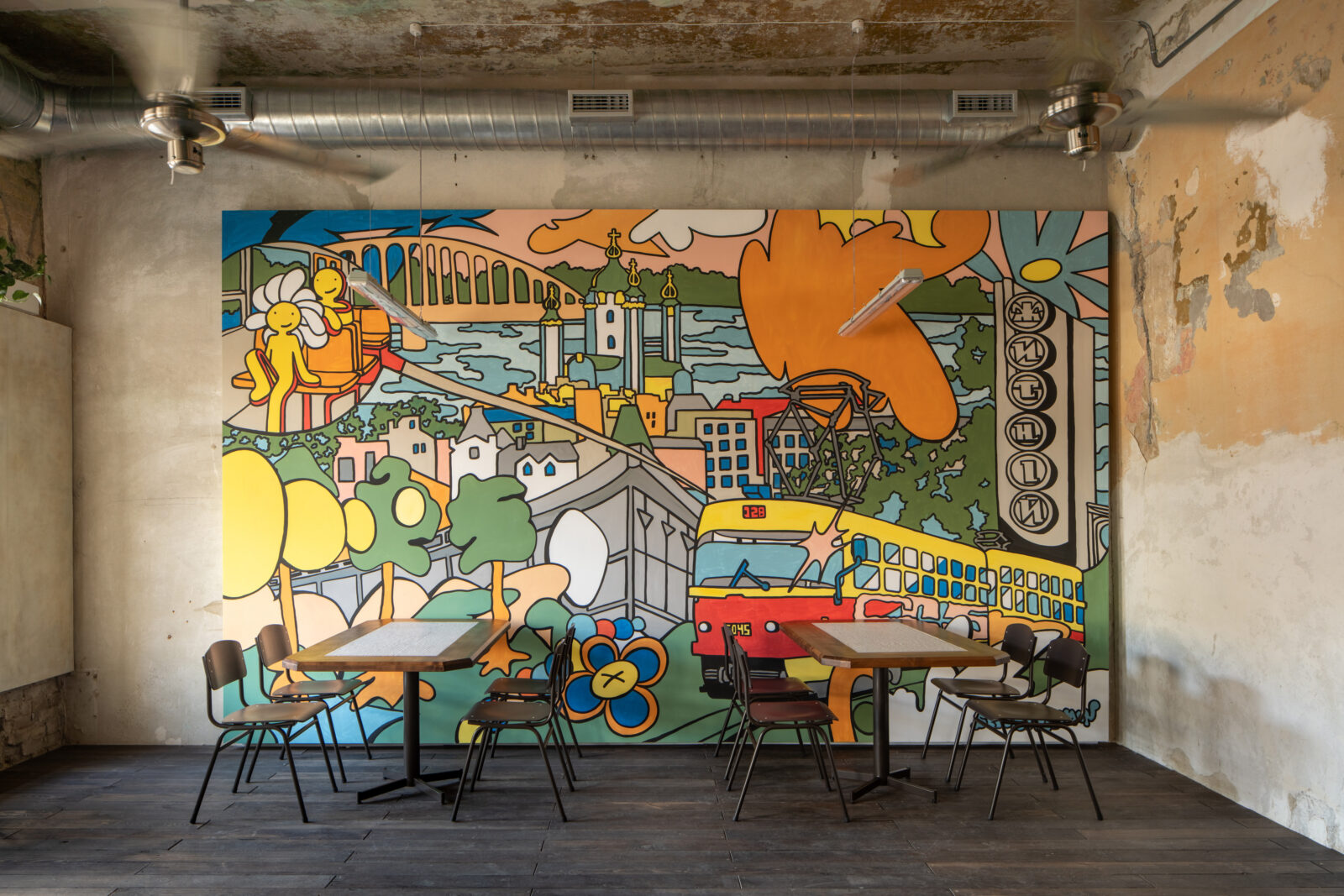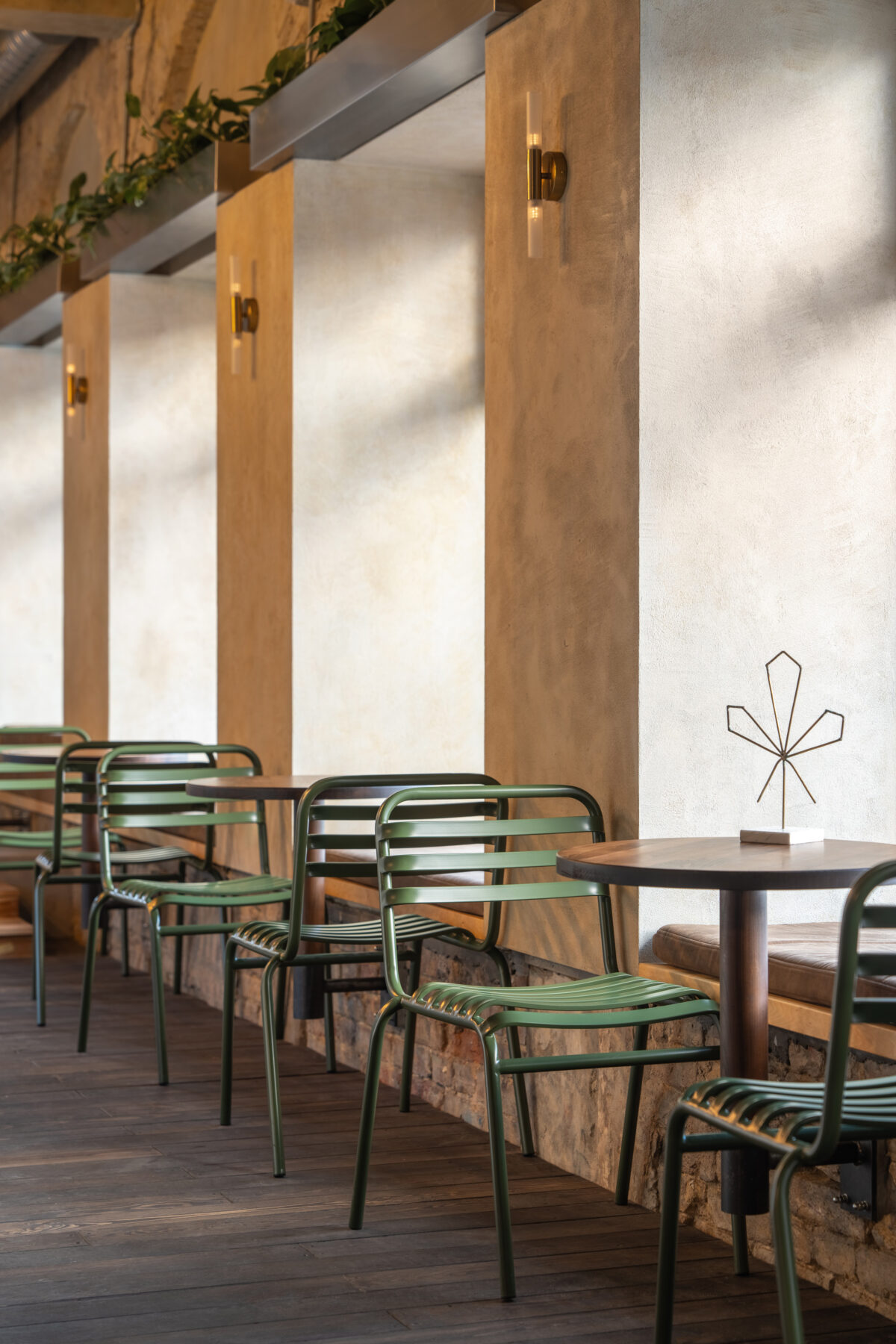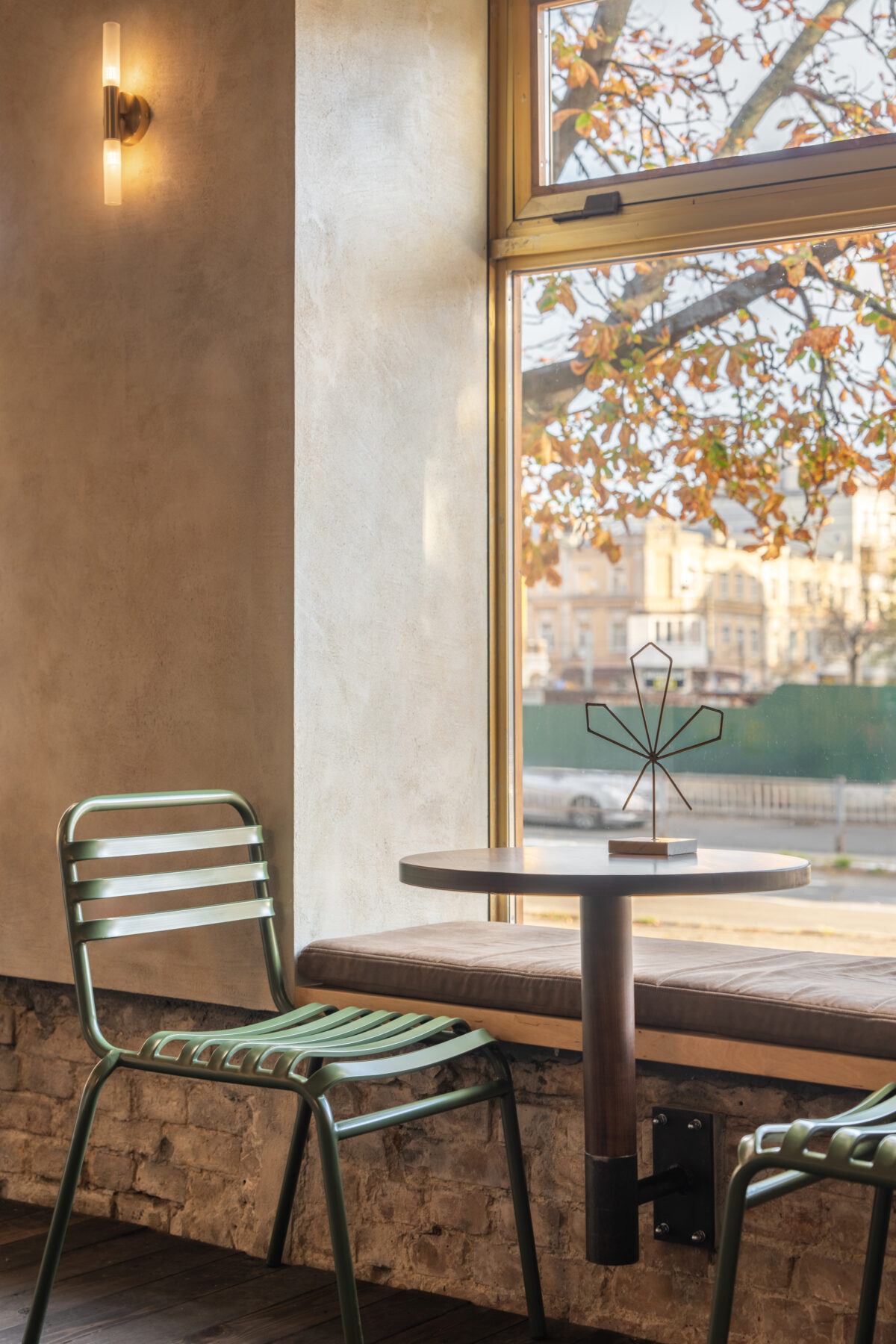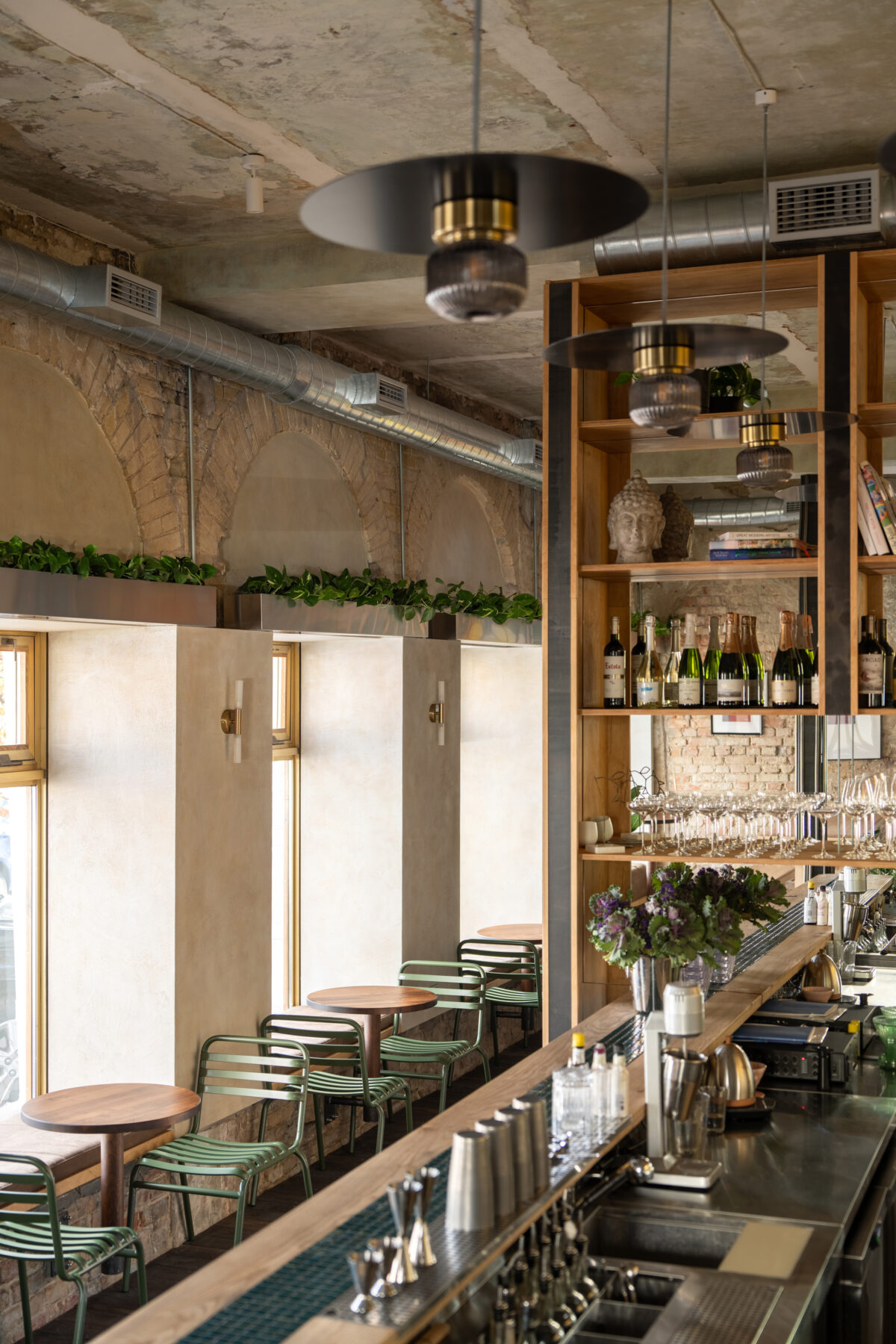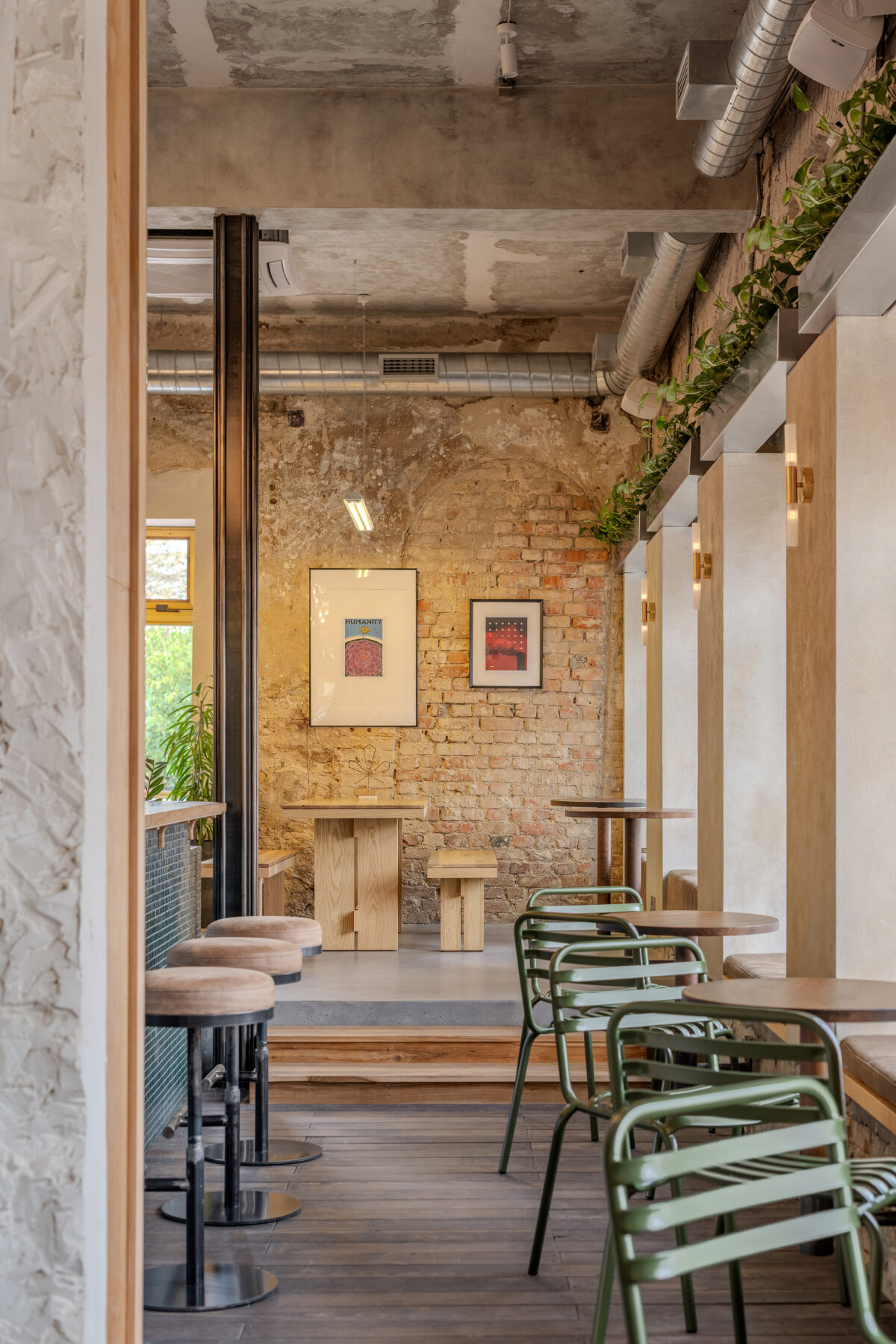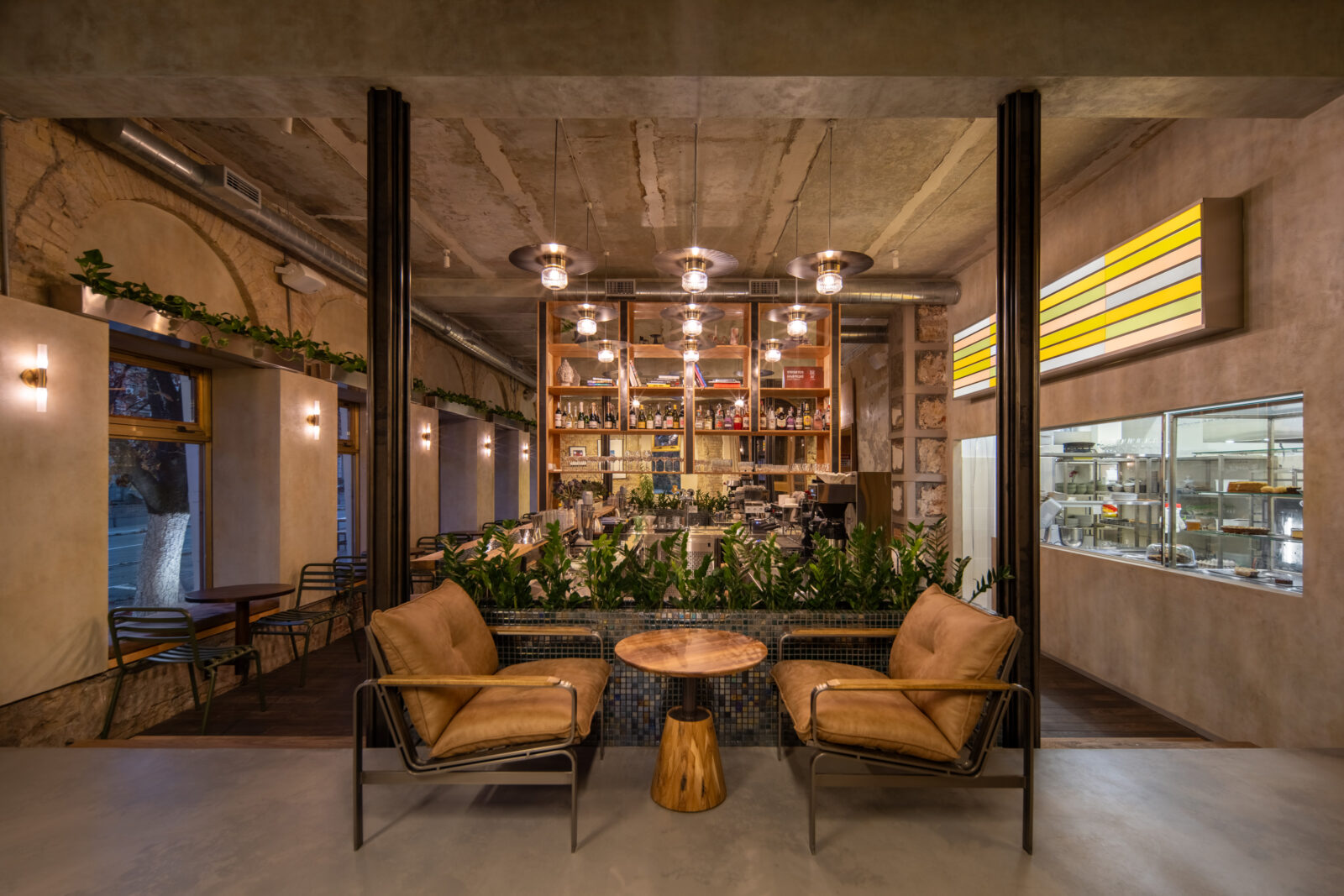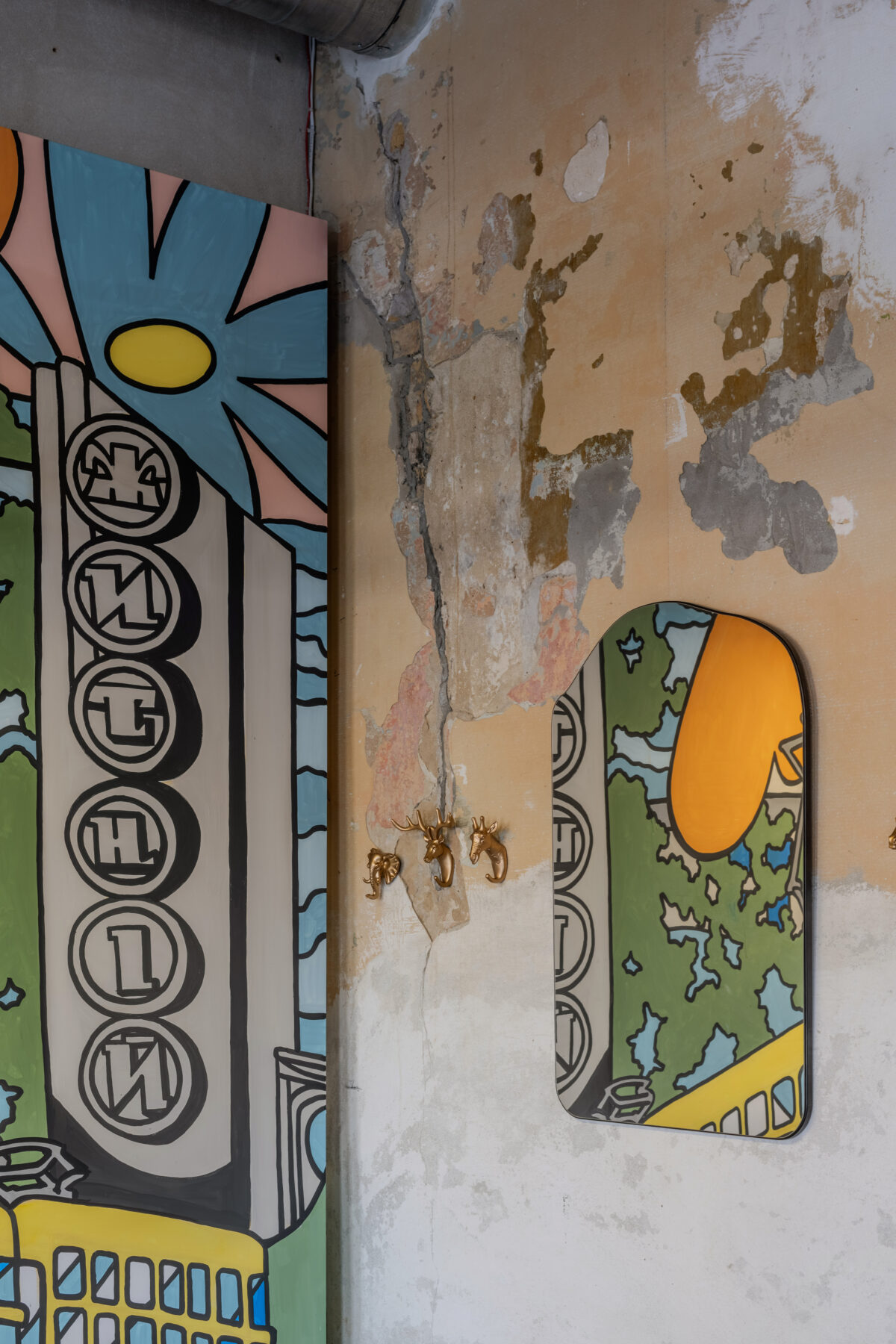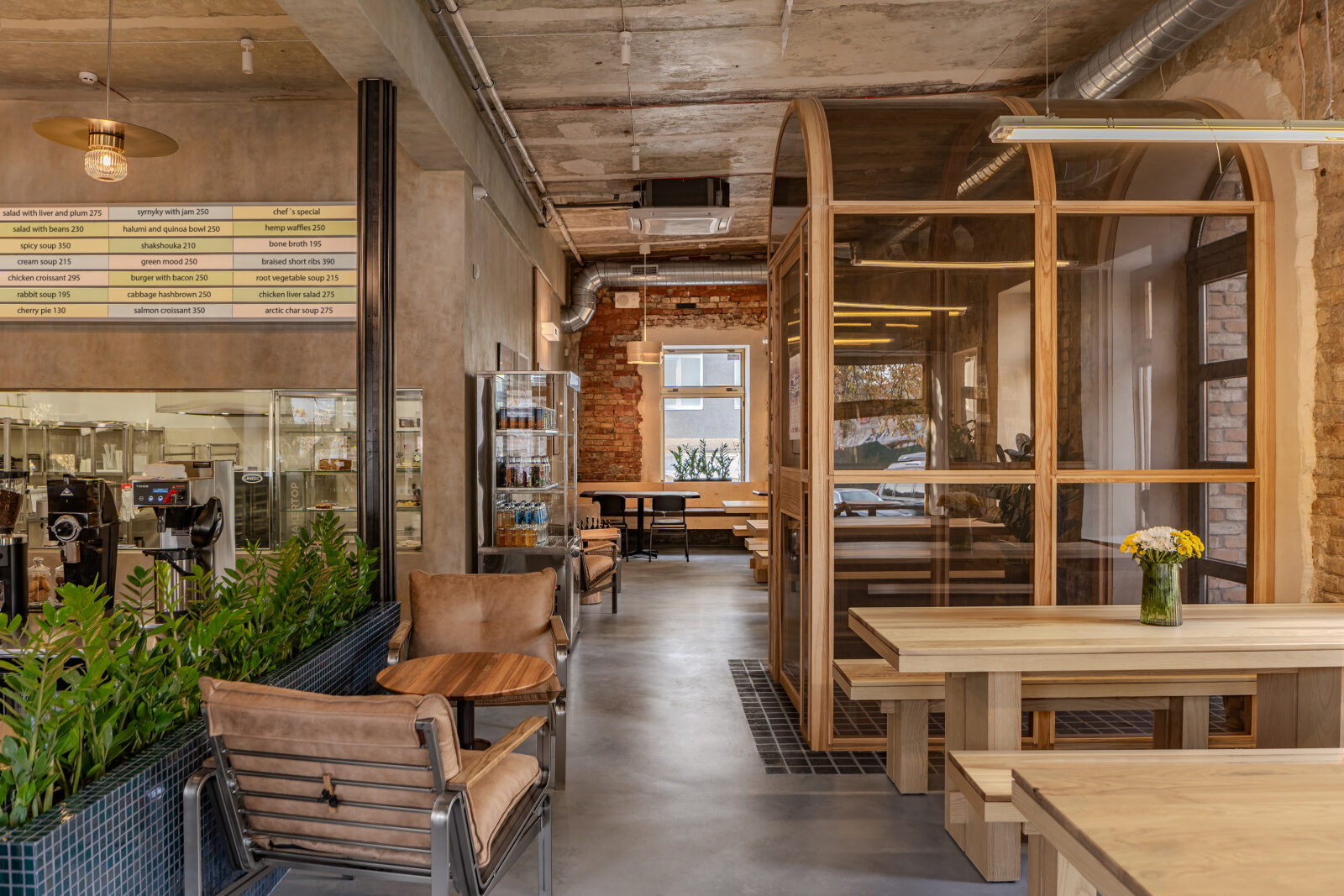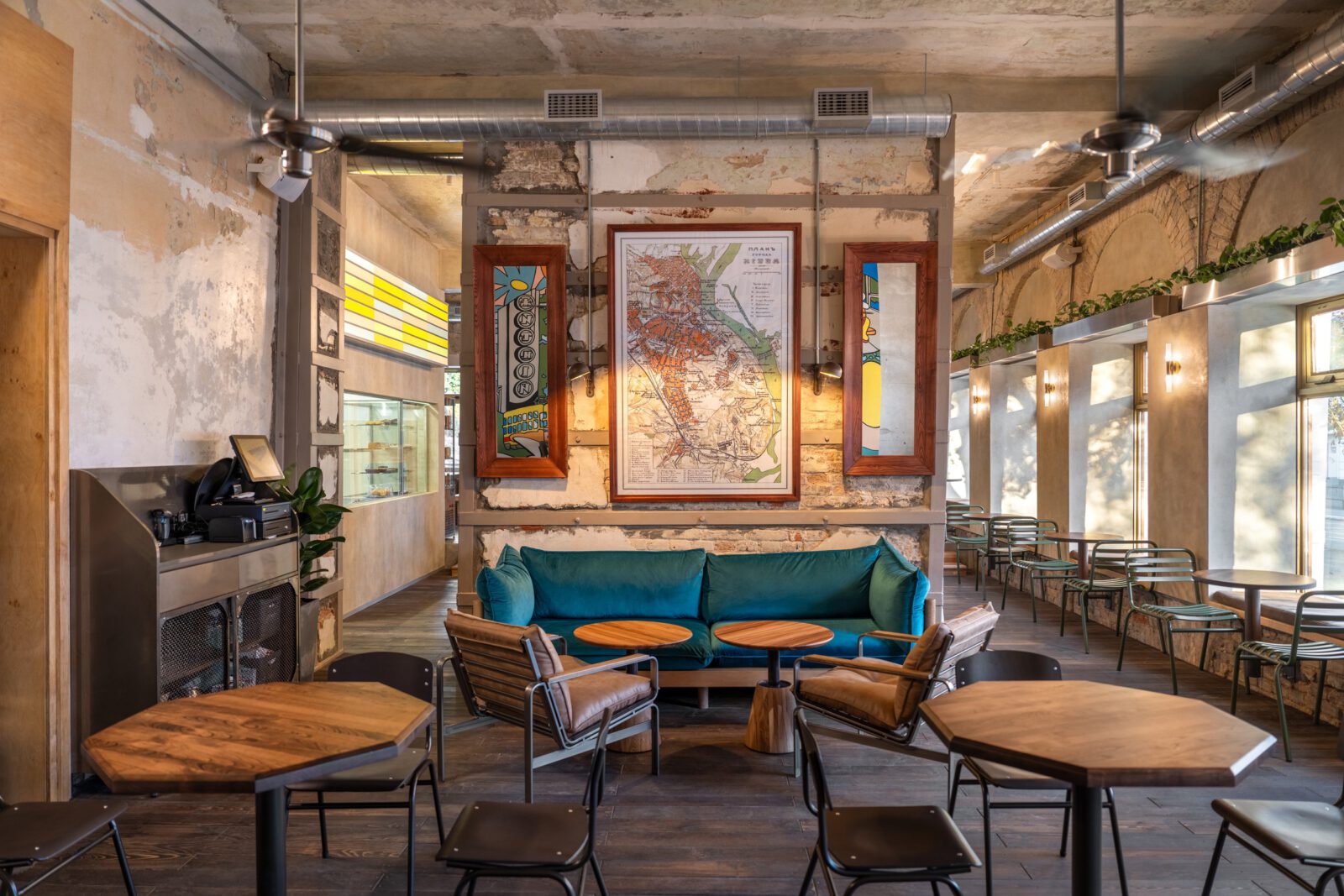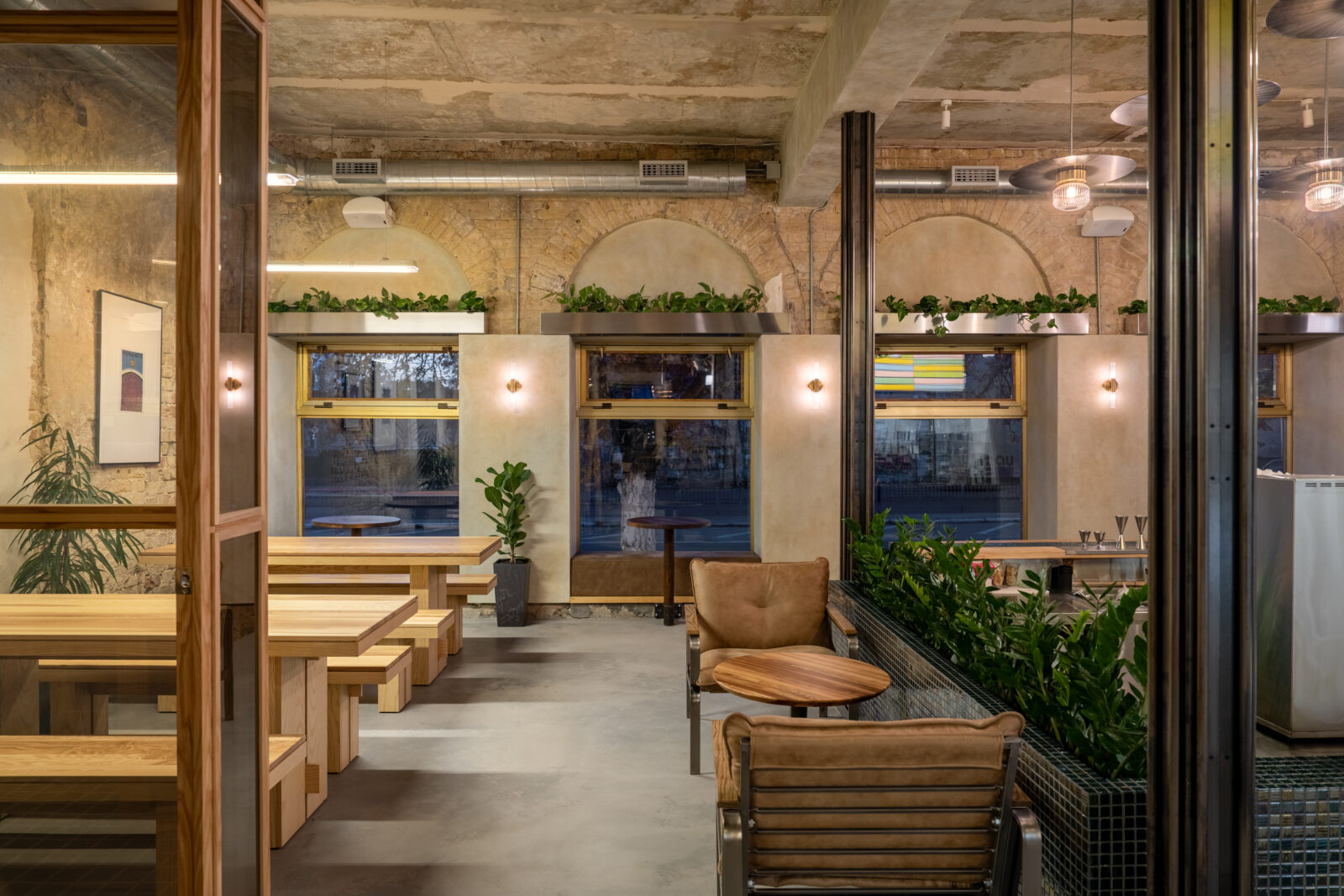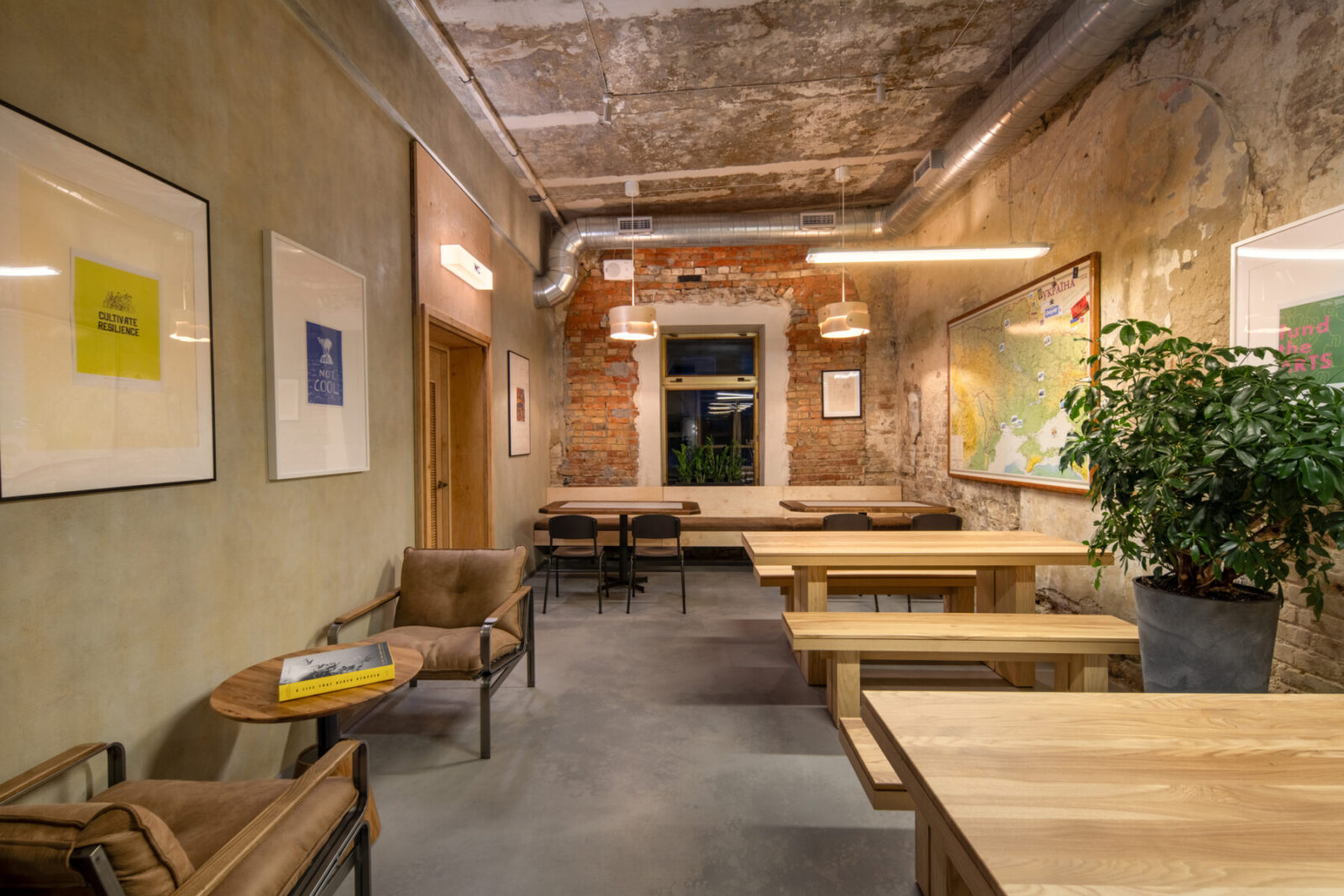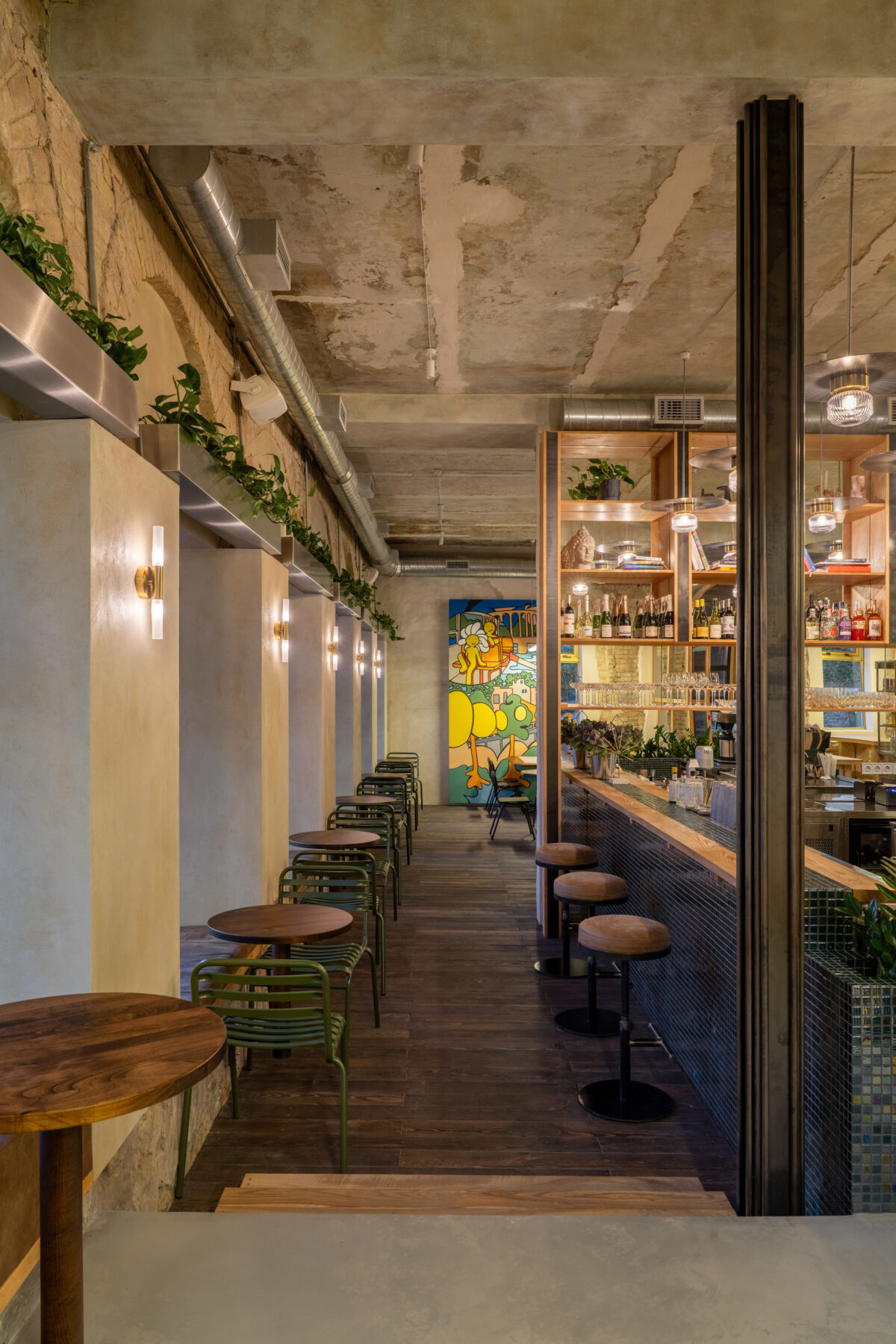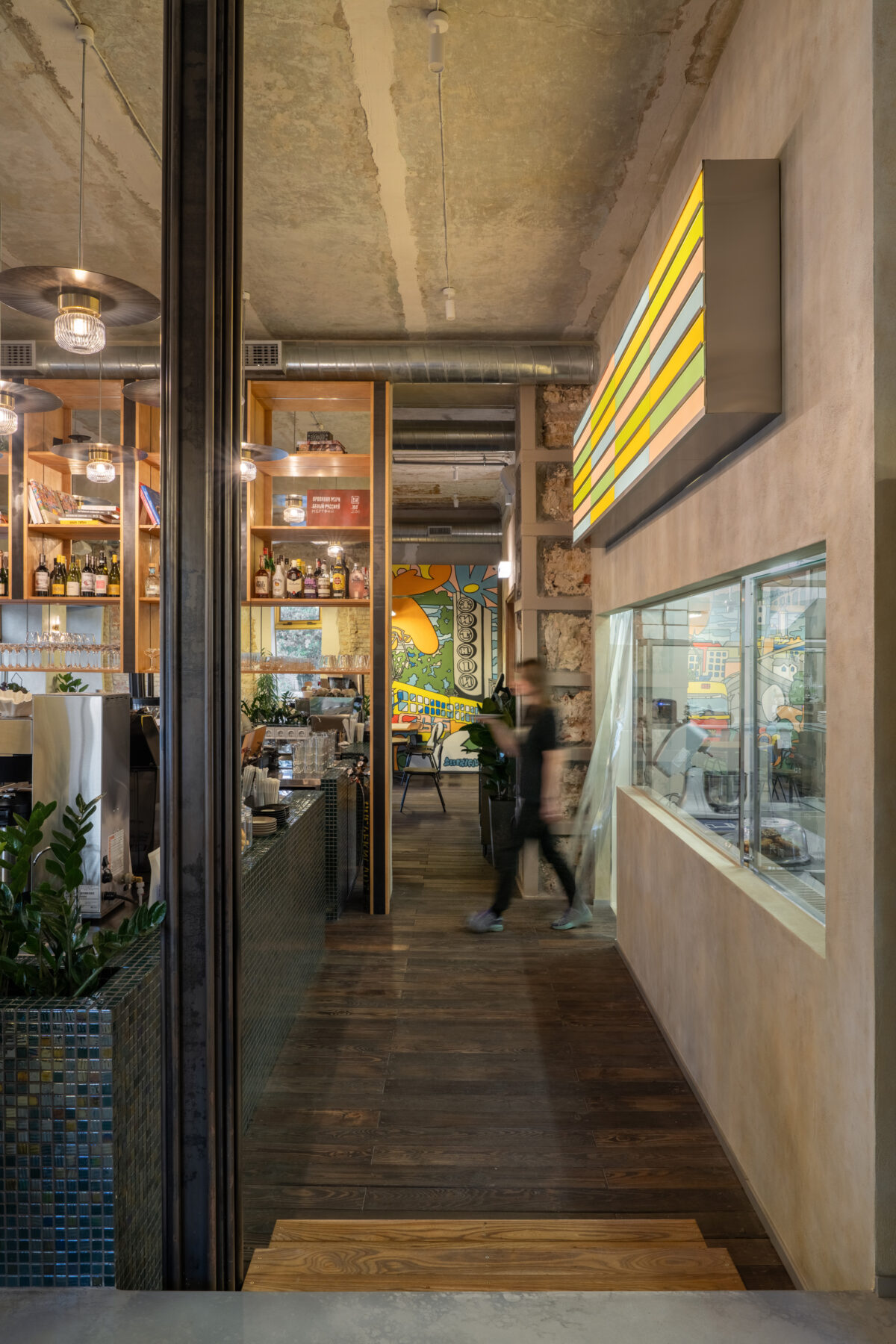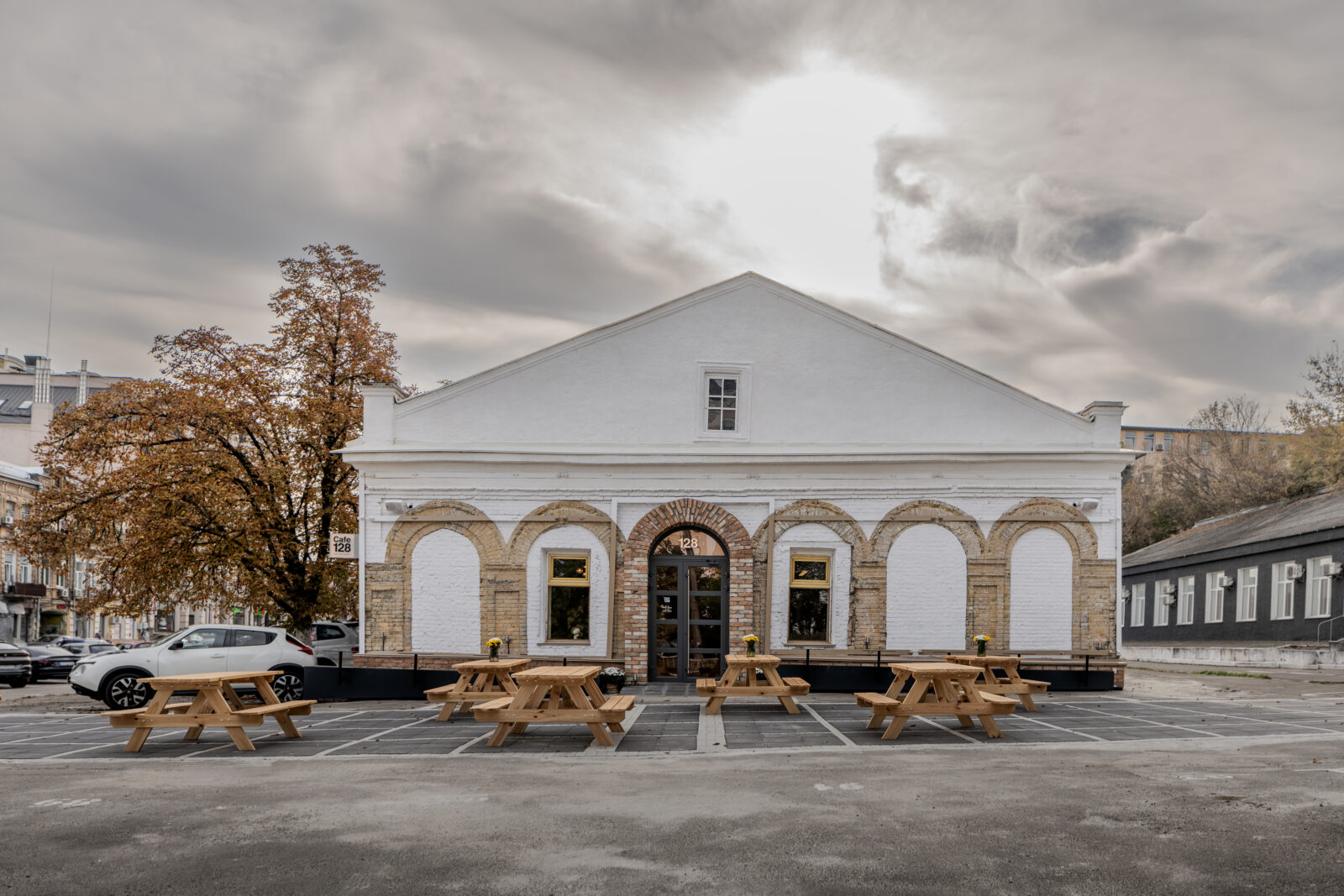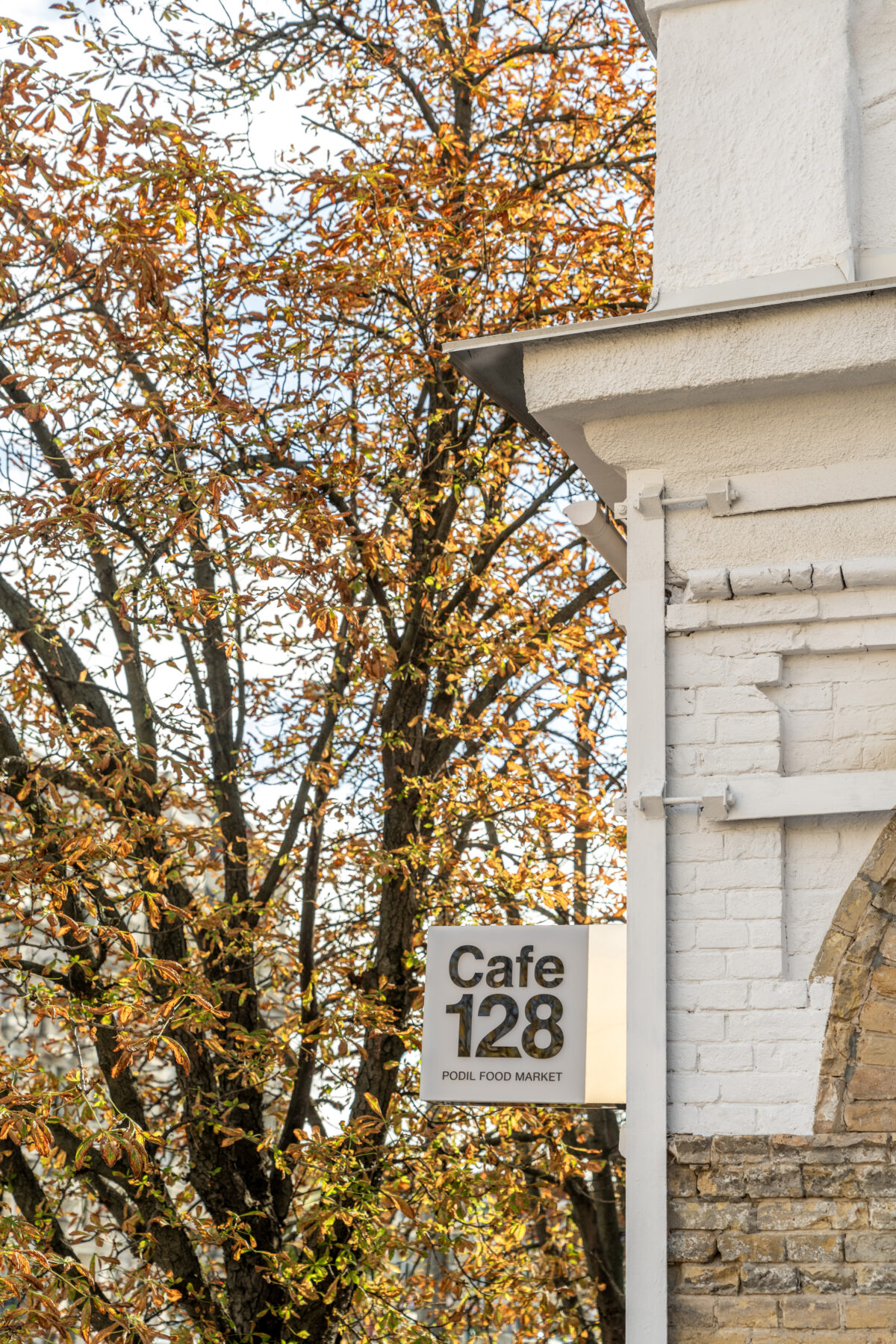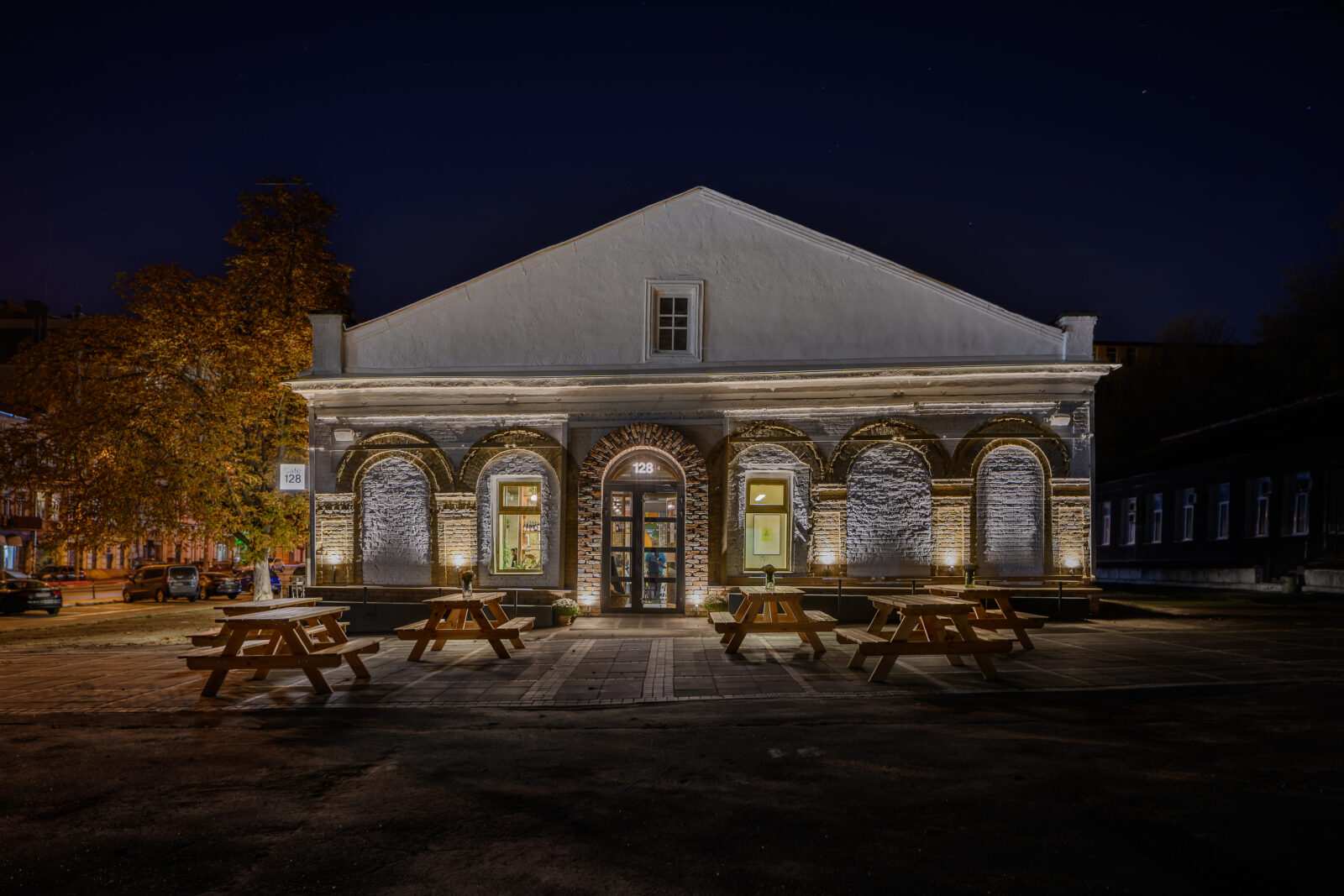Balbek Bureau designed 128 Podil Food Market in Kyiv and managed to create a new place that would quickly become a community hub with a simple, familiar vibe.
128 Podil Food Market is the flagship of the Kyiv-based 128 cafe chain, located in the building of a former bus station in Podil. Four other cafes of the cafe chain are situated in residential complexes in different parts of the city. Each establishment has its unique features, but all are united by the cozy, comfortable, and relaxed cafe format. Podil’s 128 was meant to be the first location in the city center and simultaneously test out a new food market format.
According to the client’s vision, during the warm season, food trucks would appear on the summer terrace, hosting festivals of national cuisine.
The task was deceptively simple – to create a new place that would quickly become a community hub with a simple, familiar vibe.
The client wanted a convenient and understandable design with plenty of light and plants inside the cafe. Straight aggressive angles and shiny metal elements were undesirable – anything that could overly modernize the historical space of the old building.
CONSTRUCTION
Work on the establishment came to a halt due to Russia’s full-scale invasion of Ukraine – the 128 was supposed to open in spring 2022. Construction resumed after winter blackouts, in the spring of 2023. The building of the former bus station was in a severely neglected state. Its space was divided into numerous small, cramped rooms filled with clutter and Soviet-era office furniture. It was necessary to dismantle internal partitions to expand the space and allow more light into the cafe. At the same time, all load-bearing structures had to be retained – the building was very old and had undergone multiple renovations, causing the walls to literally crack at the seams. The challenge was presented by almost all surfaces – there seemed to be no level ones; the walls and ceiling were very uneven.
Working with historical buildings always brings unexpected discoveries. During the demolition, we found the yellow classic Kyiv brick on the site, characteristic of buildings from that period, with bricked-in arch construction and a basement. The brick became the authenticity we aimed for in the design of 128. On the left side of the facade, we refreshed the plaster, cleaned the main facade with the entrance group. Historical brick arches were restored – the entrance arch was adorned with the yellow brick that remained after the demolition.
After coordinating the complex demolition, we faced the need to reinforce the building’s columns with metal encasement – they were needed for safety reasons. Due to the column encasement, we decided to fill the space between the windows with plastered fragments. The main reference for the painters was the old plaster that, in some places, had been preserved. Since there were different rooms with varying floor levels in the bus station building unified into one, we decided not to pour the screed in the second hall but to lay it on the joists—this was a quick and simple solution. In the first hall, the floor is poured.
INTERIOR
According to our concept, the interior of the establishment reflects the Podil theme. The entrance is designed as a glass vestibule, protecting guests at the tables on either side of the entrance from drafts. On the vestibule floor, we used the same pavement as the fragment of the summer terrace, bringing the street inside and visually connecting the interior and exterior. At the exit from the vestibule, guests are greeted by the first hall and bar. DIY lamps hang over the bar – we bought lampshades and golden saucers at IKEA, complemented them with metal cut circles, and created a custom solution.
To the left is the passage to the second, more secluded hall, where lounge-style seating awaits guests. The panel in the second hall was created by Kyiv artists, the Feldman sisters. They collaborated with the owner and proposed a panel with a tram, supporting the urban theme of the establishment and Podil spirit. The establishment’s kitchen area is partially open – in the pastry workshop, separated from the hall by glass, cafe bakers bake pastries and bread. Guests can observe the workshop’s work, order coffee, or choose a dessert from the open display. Above the pastry workshop, there is a light box menu made of colored plates where dish names will be assembled from letter cutouts on transparent organic glass. This light box is a reference to the former bus station and bus schedule.
All furniture chosen for the cafe is of Ukrainian origin. All tables and shelves are custom-made by Ukrainian contractors based on designs and sketches from the bureau. For the decoration of the 128, the owner brought a large stack of posters from New York of various sizes and formats. We selected our favorites and decorated them in various frames, hanging them on the walls. This adds spatial detailing, a sense of coziness and allows visitors to examine the walls while waiting for their orders. During construction, we found an old map of Ukraine, which we decided to clean, frame, and use in the interior. It echoes the printed map of Podil.
To the right of the entrance are two restrooms: standard and one for people with reduced mobility. For the floor decoration, we found multi-colored tiles on OLX, asked tilers to cut them into pieces, and embedded them in microcement, which is then polished – a meticulous job. Splashes of green color on the walls add a playful vibe to the space. In both cabins, there are garden cast-iron sinks with distinctive faucets. Another sink is made from an IKEA table – a hole was cut in the countertop for the sink. The blue mirrored sign above the sink is neon: tubes are fixed between several mirrors with film and glass, creating a recursion effect of the inscription.
EXTERIOR
Opposite the entrance to 128 Podil Food Market, food trucks will be located. We have obtained a site in the form of a parking lot sloping along the facade. To organize the outdoor seating, we proposed cutting out a piece of asphalt, leveling it horizontally, and paving it with cobblestones, on which tables will be placed. This way, we created a cobblestone carpet, the design of which is inspired by the quarter grid of Podil’s development, maintaining a visual connection with the building’s foundation. In this way, we broke up the large asphalt space in front of the establishment and integrated it with the main facade. In the summer, the area will be complemented with benches and tables – several seating points are planned along the side facade, under chestnut trees – as well as green plants.
For us, 128 Podil Food Market became an opportunity to breathe new life into a historical building and work in our beloved Podil (we’ve created the Bursa hotel, the beer restaurant This Is Pyvbar, the cafe “Dyletant,” and the 6:19 tattoo salon here). Despite all the challenges of the project, we have created a place with soul and are already looking forward to the first street food festivals in the shade of old chestnuts.
Facts & Credits
Project title: 128 Podil Food Market
Typology: Interior, Bar-Restaurant
Location: Kyiv, Ukraine
Architecture: Balbek Bureau
Architects: Slava Balbek, Lena Briantseva, Vitalina Hoshovska
Project year: 2023
Photography: Andrey Bezuglov, Maryan Beresh
Text: provided by the architects
READ ALSO: The Silver Lining House in San Francisco, USA | by Mork-Ulnes Architects & Alison Damonte
